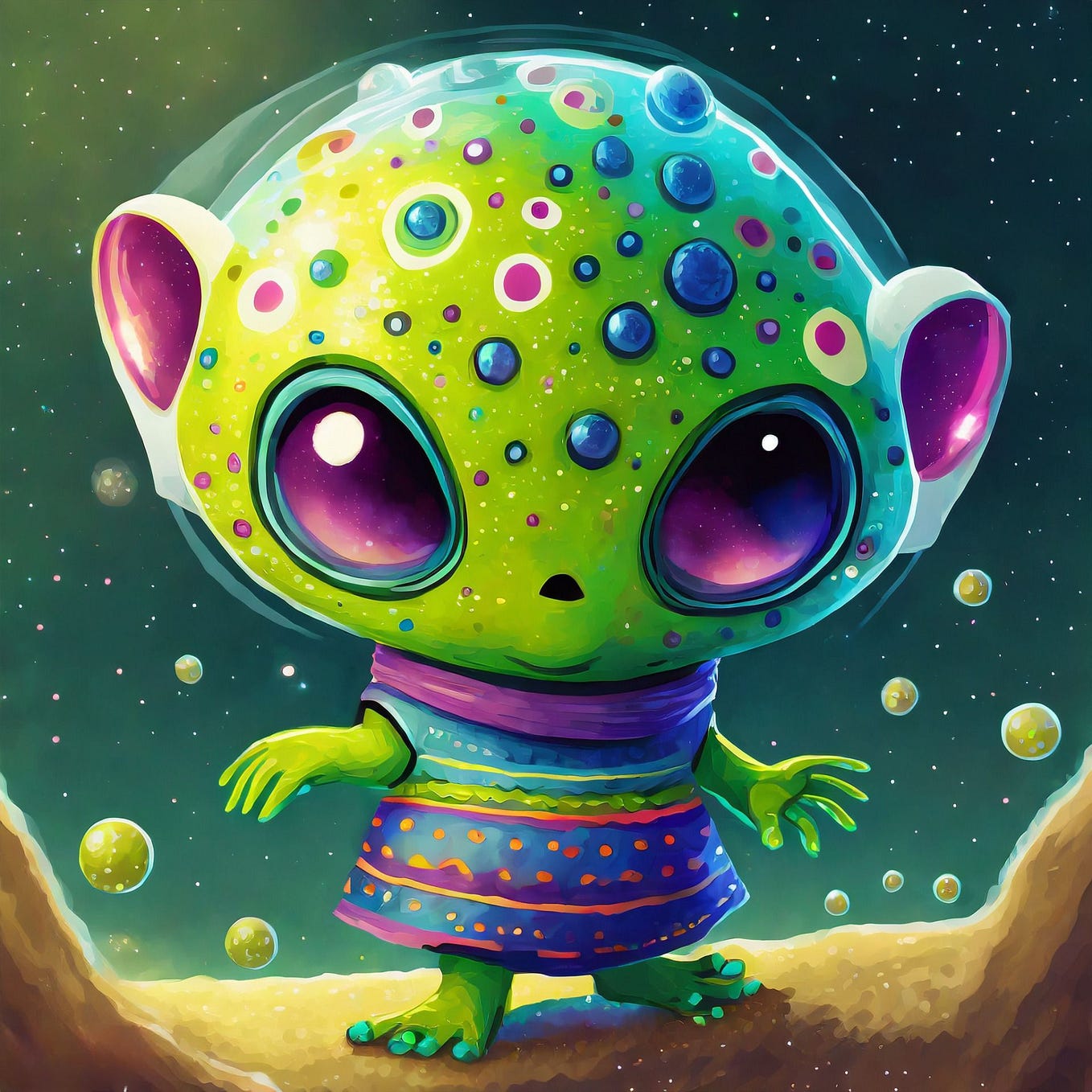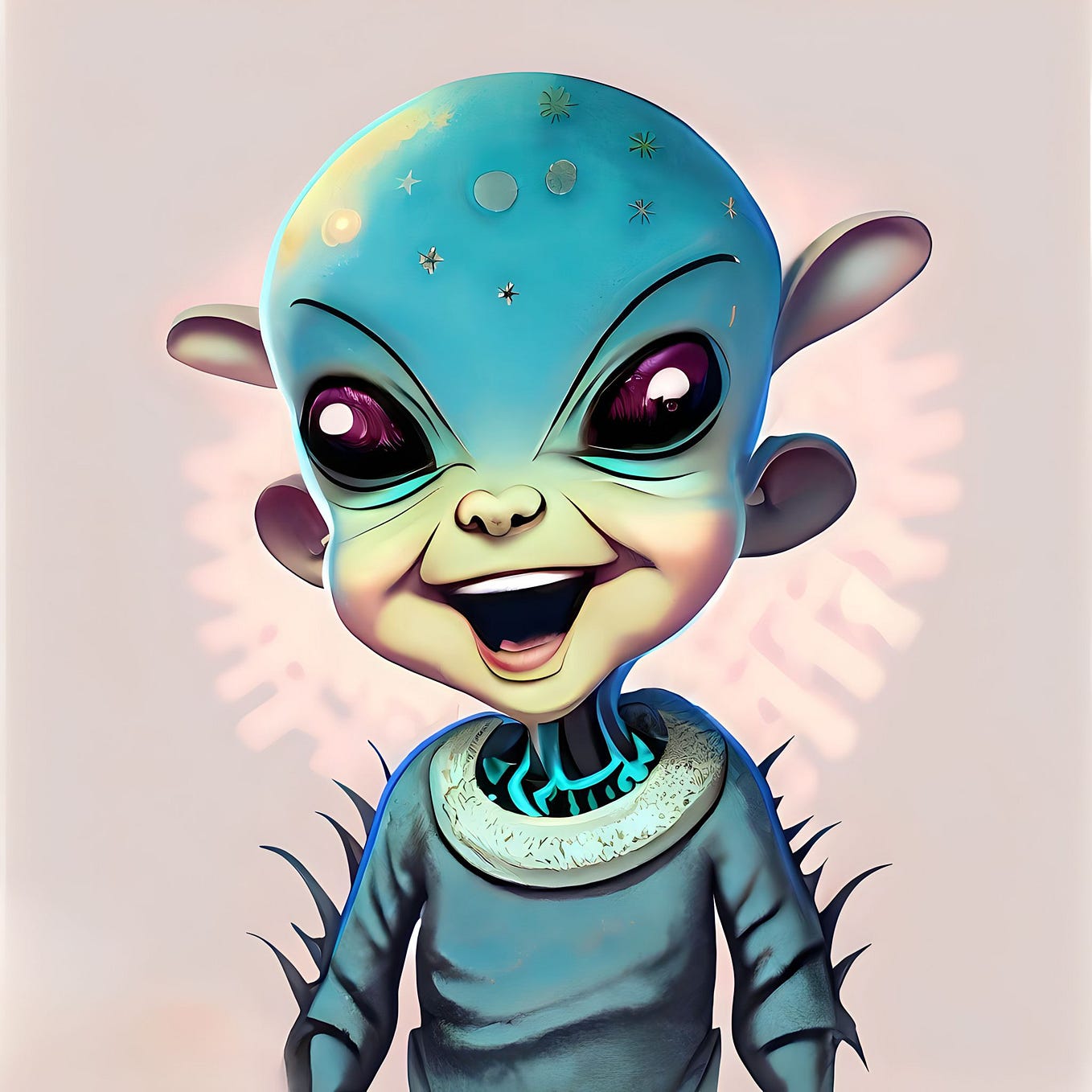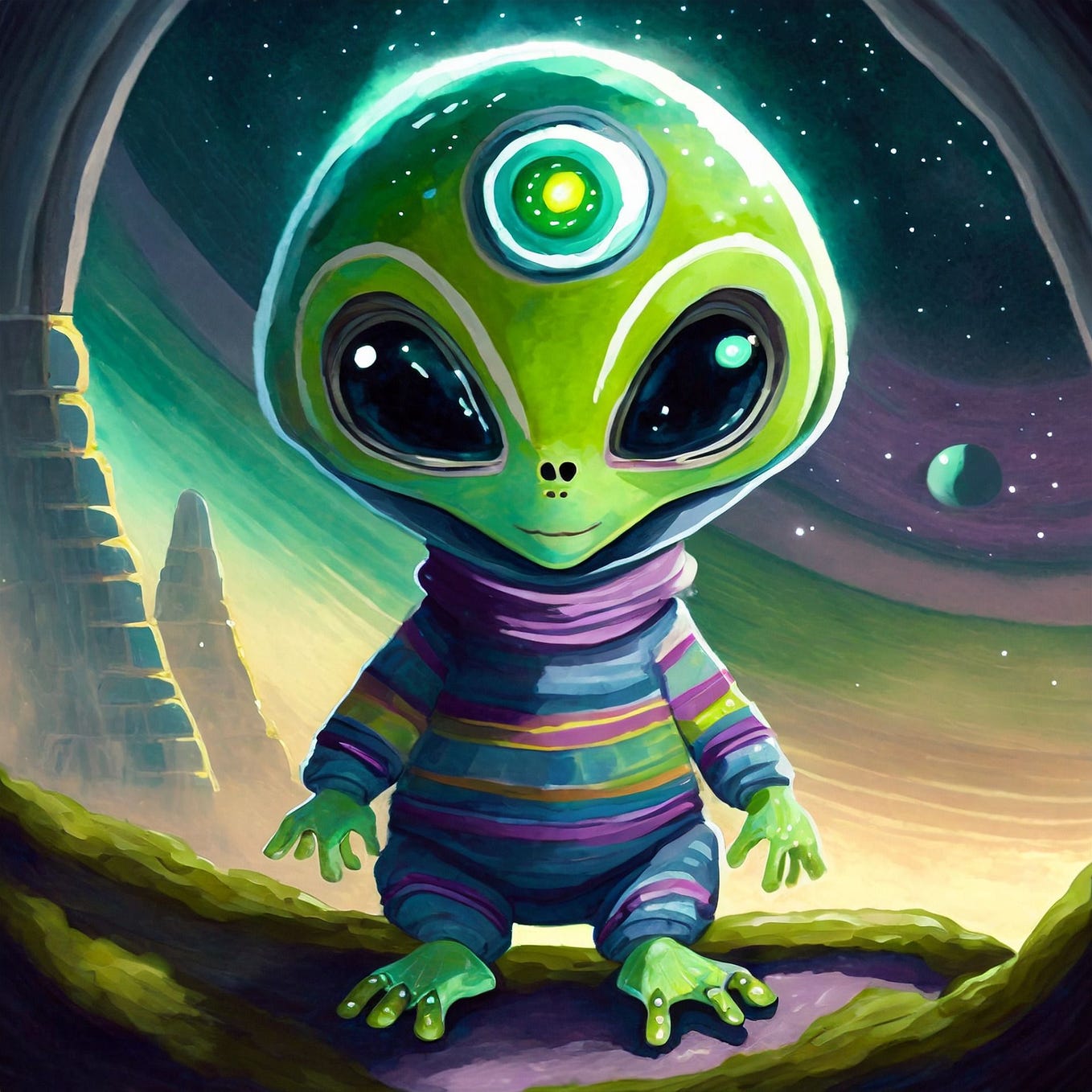Baby Alien: The Cutest Extraterrestrial Phenomenon Unveiled
Imagine stumbling upon a story that combines the innocence of a baby with the mystery of outer space. Baby alien is more than just a sci-fi concept; it's a fascinating topic that has captured the imagination of millions worldwide. From conspiracy theories to pop culture references, the idea of infant extraterrestrial beings sparks curiosity and wonder. But what exactly are baby aliens, and why are they such a hot topic in 2023?
Let’s face it, the concept of alien life has always been both terrifying and intriguing. Movies like "E.T." and "Star Wars" have shaped our perception of extraterrestrials, but what if we zoomed in on the tiniest members of their civilizations? Baby aliens, or alien infants, could be the missing piece of the intergalactic puzzle. They challenge our understanding of life beyond Earth and open up endless possibilities.
Whether you're a die-hard UFO enthusiast or just someone who loves exploring the unknown, this article dives deep into the world of baby aliens. We’ll cover everything from their potential origins to the cultural impact they’ve had on society. So buckle up and get ready for a cosmic journey you won’t forget!
Table of Contents
The Biological Perspective of Baby Aliens
Cultural Significance of Baby Aliens
- Mr Hands
- Undress Ai Explore Create With Free Ai Tools
- The Magic Of Star Session Set Your Ultimate Guide To Mastering The Art
- Project Escape Room Roblox School
- Carly Jane Onlyfans
Scientific Theories Behind Baby Aliens
Myths and Conspiracies About Baby Aliens
Possible Origins of Baby Aliens
Impact on Society and Human Perception
Frequently Asked Questions About Baby Aliens
Conclusion: Why Baby Aliens Matter
What is a Baby Alien?
Let’s break it down. A baby alien is essentially the younger version of an extraterrestrial being. Think of them as the E.T.s of the universe—curious, innocent, and possibly misunderstood. While the concept might sound far-fetched, it’s rooted in the broader discussion of alien life forms and their potential life cycles. Scientists and researchers have long debated whether alien civilizations would resemble ours, complete with stages of growth and development.
In simple terms, a baby alien could represent the early stages of an alien species' life. This raises questions about their biology, behavior, and even their role in their respective societies. Are they born, hatched, or created through some advanced technology? These are the kinds of questions that keep enthusiasts awake at night.
Why Should You Care About Baby Aliens?
Here’s the thing—baby aliens aren’t just a fun topic for sci-fi fans. They challenge our understanding of life itself. If we were to discover evidence of alien infants, it would redefine how we view our place in the universe. It’s not just about finding little green men; it’s about uncovering the mysteries of life beyond our planet.
The Biological Perspective of Baby Aliens
From a scientific standpoint, the concept of baby aliens introduces fascinating questions about biology. Would they have DNA, or something entirely different? Could they survive in environments hostile to human life? Let’s explore these possibilities.
First off, the idea of alien biology is mind-blowing. While we’re used to carbon-based life forms, alien infants might be based on silicon or other elements. This opens up a whole new realm of possibilities when it comes to their physical appearance and capabilities. For example, they could have multiple limbs, glowing skin, or even the ability to communicate telepathically.
How Do Baby Aliens Develop?
Developmental biology plays a crucial role in understanding baby aliens. If they’re anything like us, they might go through stages of growth, learning, and adaptation. But what if their development is completely different? Some theories suggest that alien infants could mature rapidly, allowing them to contribute to their civilizations at a young age.
Cultural Significance of Baby Aliens
Baby aliens have become a staple in pop culture, appearing in movies, TV shows, and even video games. They symbolize the innocence and curiosity of extraterrestrial life, making them relatable to audiences of all ages. But beyond entertainment, they also reflect our desire to connect with the unknown.
Take, for example, the character of E.T. from Steven Spielberg’s classic film. E.T. wasn’t just an alien; he was a symbol of friendship, love, and acceptance. Similarly, baby aliens in other media often serve as a bridge between humans and extraterrestrials, highlighting the potential for peaceful coexistence.
Why Are Baby Aliens So Popular?
There’s something inherently charming about the idea of alien infants. They remind us of our own childhoods and the wonder of discovering the world around us. Plus, they’re often portrayed as vulnerable and in need of protection, which tugs at our heartstrings. It’s no wonder they’ve become such a beloved trope in science fiction.
Scientific Theories Behind Baby Aliens
While baby aliens might seem like a product of imagination, there’s actually some science behind the concept. Researchers have long speculated about the existence of extraterrestrial life, and baby aliens could be a natural extension of that theory. Let’s dive into some of the most intriguing ideas.
One theory suggests that alien life forms could have evolved in vastly different environments, leading to unique adaptations. For instance, they might have developed symbiotic relationships with their surroundings or even the ability to manipulate matter at a molecular level. This would make their offspring equally fascinating and complex.
What Do Scientists Say?
Scientists like Dr. Seth Shostak from the SETI Institute have discussed the possibility of alien civilizations with advanced reproductive systems. They theorize that these civilizations might have overcome challenges like low birth rates or environmental threats, ensuring the survival of their species. This could mean that baby aliens are not only adorable but also highly resilient.
Myths and Conspiracies About Baby Aliens
No discussion about baby aliens would be complete without mentioning the myths and conspiracies surrounding them. From secret government experiments to UFO sightings, there’s no shortage of wild theories. But how much truth is there in these claims?
One popular conspiracy theory suggests that alien infants have been spotted in UFO crash sites. Proponents claim that these tiny beings were part of a larger mission to study Earth and its inhabitants. While there’s no concrete evidence to support this, it’s a story that continues to captivate the public imagination.
Separating Fact from Fiction
It’s important to approach these theories with a critical eye. While some elements might be based on real events, others are likely the result of overactive imaginations. That being said, the possibility of alien life remains an open question, and baby aliens could very well be part of the equation.
Baby Aliens in Popular Media
From blockbuster movies to bestselling novels, baby aliens have made their mark on popular culture. They’ve inspired countless stories and characters, each with their own unique take on the concept. Let’s take a look at some of the most iconic examples.
In the movie "The Fifth Element," we’re introduced to the Baby Blue, a mysterious creature with the power to destroy evil. Meanwhile, in the TV series "Futurama," baby aliens like Neptor provide comedic relief while exploring deeper themes about family and responsibility.
Why Are Baby Aliens So Memorable?
There’s something about baby aliens that sticks with us long after the credits roll. Whether it’s their quirky personalities or their otherworldly abilities, they leave a lasting impression. They remind us that even in a universe filled with danger and uncertainty, there’s still room for hope and wonder.
Possible Origins of Baby Aliens
So where do baby aliens come from? While we don’t have definitive answers, there are several theories worth considering. Some suggest that they originate from distant planets with advanced civilizations, while others believe they might be the result of genetic experimentation.
Another intriguing possibility is that baby aliens are part of a larger intergalactic network, designed to spread life across the universe. This theory aligns with the concept of panspermia, which proposes that life could travel through space on comets or asteroids.
What Does the Future Hold?
As technology continues to advance, our ability to search for alien life improves. Telescopes like the James Webb Space Telescope are already providing new insights into distant worlds, and who knows what discoveries lie ahead? It’s entirely possible that one day we’ll find evidence of baby aliens, changing the course of human history forever.
Impact on Society and Human Perception
The discovery of baby aliens would have profound implications for society. It would force us to reevaluate our beliefs about life, the universe, and our place within it. But it would also raise ethical questions about how we interact with extraterrestrial beings, especially those in their infancy.
Imagine the global reaction to finding a baby alien. Would we welcome it with open arms, or would fear and paranoia take over? These are the kinds of questions that keep scientists and philosophers up at night.
How Would We Coexist?
Coexistence with baby aliens would require a new level of understanding and cooperation. We’d need to develop methods of communication and establish guidelines for interaction. It’s a daunting but exciting prospect that highlights the potential for positive change.
Frequently Asked Questions About Baby Aliens
Q: Are baby aliens real?
A: There’s no concrete evidence to suggest that baby aliens exist, but the possibility can’t be ruled out. Scientists continue to search for signs of extraterrestrial life, and who knows what they might discover?
Q: Why are baby aliens important?
A: Baby aliens represent the next frontier in our understanding of life beyond Earth. They challenge us to think beyond our own limitations and embrace the unknown.
Q: How do baby aliens differ from adult aliens?
A: The differences could vary depending on the species, but in general, baby aliens might be smaller, less developed, and more dependent on their caregivers. They could also possess unique abilities that set them apart from their adult counterparts.
Conclusion: Why Baby Aliens Matter
As we’ve explored in this article, baby aliens are more than just a fun topic for conversation. They represent the possibility of life beyond Earth and the potential for connection with other intelligent beings. While the concept might seem far-fetched, it’s rooted in scientific inquiry and cultural fascination.
So the next time you gaze up at the stars, remember that somewhere out there, a baby alien might be doing the same. The universe is vast, mysterious, and full of surprises, and baby aliens could be the key to unlocking its secrets.
Now it’s your turn. What do you think about baby aliens? Share your thoughts in the comments below, and don’t forget to check out our other articles for more mind-blowing content!
- 3tara Westover Husband
- Johnny Argent
- Dakota Johnson Nude
- Project Escape Room Roblox School
- Kim K With Ray J Sex Tape

Baby Alien 54 Ufoalienchaos Medium

Baby Alien 1 Ufoalienchaos Medium

Baby Alien 40 Ufoalienchaos Medium